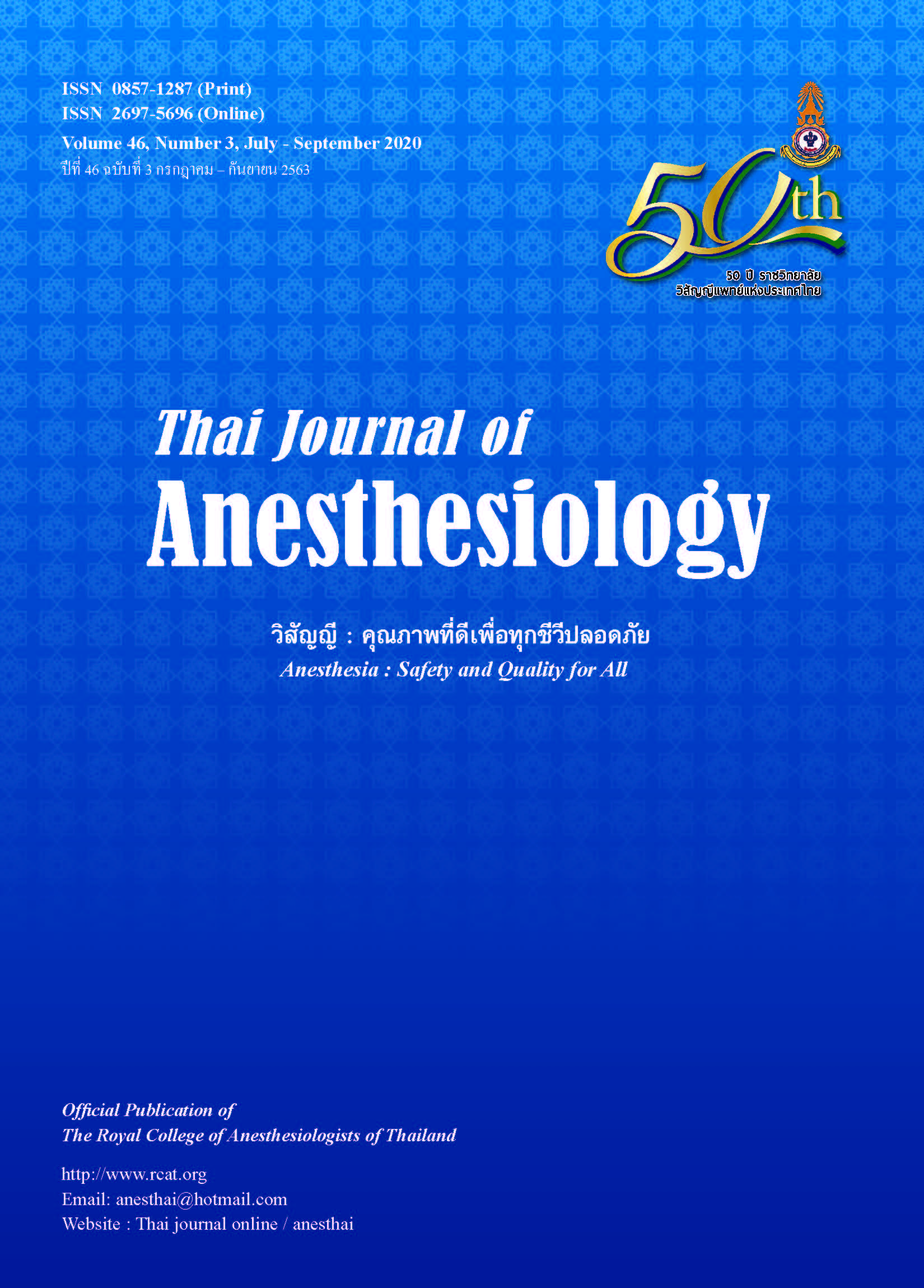การคงอยู่ของความรู้เรื่องการช่วยฟื้นคืนชีพภายหลังการเรียนรู้แบบทีมของ นักศึกษาแพทย์ชั้นปีที่ 6
Main Article Content
บทคัดย่อ
Background: A three-day cardiopulmonary resuscitation
(CPR) training program was provided for all medical
students at the beginning of the 6th year training program.
Immediately after training, they all passed the written and
resuscitation examinations. Moreover, they also had
experiences of resuscitation events in real situation as a
leader or a member of the CPR team. But most of them
got low score from CPR station in the step three National
License examinations (NL3) at the end of the 6th year. To
improve knowledge retention, team-based learning (TBL)
was used in the resuscitation training program.
Objective: To assess medical student’s knowledge
retention after CPR training using team-based learning.
Methods: Six months after standard CPR training, all
students attended a one day team-based learning training
program, start with performing resuscitation skill in
simulated cardiac arrest scenario as pre-test. Then
divided the student into 4 groups, closed book case-based
discussion was done in each group. One student from
each group conducted teaching and group discussion
under supervision of the instructor. After discussion ended,
all students received two examinations in simulated
condition similar to the pre-test, immediate after training
(post-test 1) and 75 days after the class (post-test 2).
Result: Thirty-four from forty-five students completed this
study. The passing rate from pre-test, post-test 1 and
post-test 2 were 29.4%, 88.3% and 85.3%, respectively.
Conclusion: Team-based learning combined with lecture
and simulation based in the CPR training can retained a
high level of knowledge at 75 days after learning.
Article Details
เอกสารอ้างอิง
Building blocks for success. 1st ed. New York: John Wiley&
Sons;1999. p368.
2. Sullivan N. An integrative review: Instructional strategies to
improve nurses’ retention of cardiopulmonary resuscitation
priorities. Int J Nurs Educ Scholaesh 2015;12(1):37-43.
3. Cortegiani A, Russotto V, Montalto F, et al. Effect of
high-fidelity simulation on medical students’ knowledge about
advanced life support: A randomized study. PLoS one
2015;10(5):e0125685. doi.org/10.1371/journal.pone.0125685.
4. Wang C, Huang CC, Lin SJ, Chen JW. Using multimedia
tools and high-fidelity simulations to improve medical
students’ resuscitation performance: an observational study.
BMJ open 2016;6(9):e012195. doi.org/10.1136/ bmj open-
2016-012195.
5. Cevik AA, ElZubeir M, Abu-Zidan FM, Shaban S. Team-based
learning improves knowledge and retention in an emergency
medicine clerkship. Int J Emerg 2019;12(6):1-8.
Bennett BT, Deitch NR. Safety and healthy training, in
preparing for OSHAs voluntary protection program: A guide
to success.1st ed. New Jersey: John Wiley& Sons; 2010.
P 298.
7. Sisk RJ. Team – based learning: Systematic research review.
J Nurs Educ 2011;50(12):665-9.
8. Mennenga HA, Smyer T. A model for easily incorporating
team–based learning into nursing education. Int J Nurs Educ
Scholarsh 2010;7(1). DOI: 10.2202/1548-923X.1924 .
9. Clark MC, Nguyen HT, Bray C, Levine RE. Team-based
learning in an undergraduate nursing course. J Nurs Educ
2008;47(3):111-7.
Chamberlain D. Smith A, Woollard M, et al. Trials of teaching
methods in basic life support (3): Comparison of simulated
CPR performance after first training and at 6 months, with a
note on the value of re-training. Resuscitation 2002;53:179-87.
11. Rezaee R, Moadeb N, Shokrpour N. Team-based learning:
A new approach toward improving education. Acta Medica
Iranica 2016; 54(10): 678-82.
12. Boysen-Osborn M, Anderson CL, Navarro R, et al. Flipping
the advanced cardiac life support classroom with teambased
learning: comparison of cognitive testing performance
for medical students at the University of California. J Educ
Eval Health Prof 2016; 13(11):1-20.


